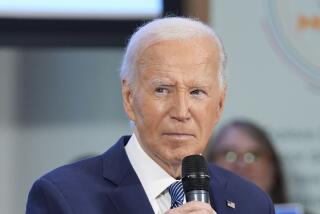Imperatives for Bush
- Share via
ALEXANDRIA, VA. — Now that Texas Gov. George W. Bush has secured the GOP presidential nomination, he must shift to confront Vice President Al Gore in what may well be the longest, most contentious, general election campaign in history. The critical time for Bush is now through the GOP convention in early August. Here are strategic imperatives Bush needs to address during this window:
* Consolidate the GOP base and draw in McCain voters. Bush is already achieving the former, given that current polling shows him with more than 80% of the GOP vote. This is a sign that the adage “nothing will better serve to unite the larger GOP than targeting the defeat of Al Gore” is true. In addition, Bush’s recent speeches, beginning with his victory speech on Super Tuesday, demonstrated he knows how to attract John McCain voters: by appealing to high standards, leadership, optimism, guts and a tolerant, inclusive GOP.
* Continue to emphasize integrity and restoring honor to the White House. Gore and the Democratic Party continue to suffer from Clinton fatigue and emit an odor of impropriety for both Republicans and non-core Democrats. Bush should capitalize on this with straight talk about values and integrity. This emerged in Bush’s March 7 speech, “I will bring honor to the process and honor to the office I seek. I will remind Al Gore that Americans do not want a White House where there is ‘no controlling legal authority.’ I will repair the broken bonds of trust between Americans and their government.”
* Aggressively highlight Gore’s chief flaw: hypocrisy. In the most audacious move of the campaign, Gore has laid claim to the banner of campaign-finance reformer. But remember that Gore accepted more that $50,000 from Buddhists who swore an oath of poverty; stonewalled the Justice Department investigation of this and other campaign-finance-related imbroglios; made dozens of fund-raising calls from the White House; and accepted money from Chinese nationals--in clear violation of the law. His chief fund-raiser, Maria Hsia, has just been convicted of five violations of campaign-finance law. Bush should press Gore to answer inquiries about his involvement.
Bush might also consider highlighting Gore’s recent “conversion” from his staunchly pro-tobacco position and his silent nod to the pollution by paper mills of his home state as additional examples of his duplicity.
* Be prepared: Gore wants this election to be about Bush. Gore has already telegraphed his four attack points, and Bush must be ready to respond. The first is the role of government in abortion policy, gun control, prescription-drug coverage and health care. Second is the politics of the budget surplus and assertions that Bush’s plan is a “risky tax scheme that will blow a hole in the budget.” Third is Bush’s record on “weakening” environmental standards, health insurance rates for women and children and delivery of a quality education. Fourth will be the inevitable exploitation of the gender gap.
In response, Bush should, for example, state clearly that he does not intend to use abortion as a litmus test when nominating Supreme Court justices. Also, he should rebut Gore’s demagoguery on prescription drugs by citing the 1994 rejection of government health-care mandates; and President Bill Clinton’s and Gore’s rejection of the bipartisan consensus to add prescription drugs to the benefit package and allow seniors to choose their plan; and by showcasing his strength in state bipartisan negotiations as the key to getting seniors coverage at an affordable price.
On guns, Bush distinguished himself from the National Rifle Assn. by disagreeing with NRA Executive Vice President Wayne LaPierre’s volatile statements, and by his support for trigger locks and future “smart guns.” Now, he should emphasize this loudly. On the budget, Bush must succeed where Bob Dole failed in ’96 and use real-life examples to show how his tax plan benefits the middle-class, thus casting Gore as a fear-monger and “typical” politician.
A simple, aggressive response on these issues, coupled with Bush’s expertise on education reform, will also serve to minimize the gender gap.
* Develop a new Republican governance. Bush needs to take the lead in recasting of the GOP agenda so it responds to the new political reality. This will demonstrate both his capacity to be president and his independence from the GOP Congress. A first step is to talk about his commitment to making the GOP, as Bush has said, “a party of inclusion, with a generous heart and an open door,” and by addressing education reform, military preparedness, tax relief, debt reduction and Social Security reform, in the context of the budget surplus, and also health-care reform that increases private-sector accountability without mandates.
If Bush can deliver on these strategic imperatives during the spring and early summer, he can then begin his next adventure: naming a running mate.
More to Read
Get the L.A. Times Politics newsletter
Deeply reported insights into legislation, politics and policy from Sacramento, Washington and beyond. In your inbox twice per week.
You may occasionally receive promotional content from the Los Angeles Times.










